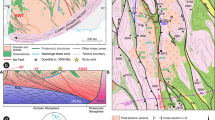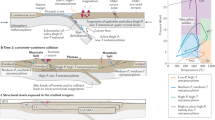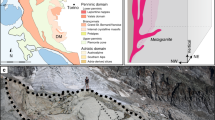Abstract
THE Earth underwent a remarkable change of behaviour at the Archean–Proterozoic boundary. Greenstone belts intruded by granites dominate the geological record before about 2.5 × 109 yr ago. After that time, essentially no such greenstone belts were formed, and long linear orogens characterised by high–grade metamorphic rocks made their first appearance.
This is a preview of subscription content, access via your institution
Access options
Subscribe to this journal
Receive 51 print issues and online access
$199.00 per year
only $3.90 per issue
Buy this article
- Purchase on Springer Link
- Instant access to full article PDF
Prices may be subject to local taxes which are calculated during checkout
Similar content being viewed by others
References
Anhaeusser, C. R. R., Mason, M. J., and Viljoen, R. P., Bull. geol. Soc. Am., 80, 2175–2200 (1969).
Cloud, P., Am. J. Sci., 272, 537–548 (1972).
Condie, K. C., Bull. Geol. Soc. Am., 84, 2981–2992 (1973).
Ernst, W. G., Am. J. Sci., 272, 657–668 (1972).
Naldrett, A. J., Bull. Can. Inst. Min. Metall., 66, 45–63 (1973).
Author information
Authors and Affiliations
Rights and permissions
About this article
Cite this article
STRONG, D., STEVENS, R. Possible thermal explanation of contrasting Archean and Proterozoic geological regimes. Nature 249, 545–546 (1974). https://doi.org/10.1038/249545a0
Received:
Revised:
Issue Date:
DOI: https://doi.org/10.1038/249545a0
This article is cited by
Comments
By submitting a comment you agree to abide by our Terms and Community Guidelines. If you find something abusive or that does not comply with our terms or guidelines please flag it as inappropriate.



